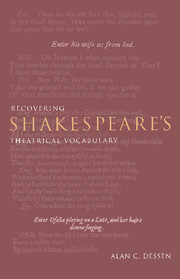Book contents
- Frontmatter
- Contents
- Preface
- Note on texts and old spelling
- 1 The problem, the evidence, and the language barrier
- 2 Lost in translation
- 3 Interpreting without a dictionary
- 4 Juxtapositions
- 5 Theatrical italics
- 6 Sick chairs and sick thrones
- 7 Much virtue in as
- 8 The vocabulary of “place”
- 9 “Romeo opens the tomb”
- 10 Vanish and vanishing
- Conclusion: So what?
- Notes
- Plays and editions cited
- Index
Conclusion: So what?
Published online by Cambridge University Press: 07 May 2010
- Frontmatter
- Contents
- Preface
- Note on texts and old spelling
- 1 The problem, the evidence, and the language barrier
- 2 Lost in translation
- 3 Interpreting without a dictionary
- 4 Juxtapositions
- 5 Theatrical italics
- 6 Sick chairs and sick thrones
- 7 Much virtue in as
- 8 The vocabulary of “place”
- 9 “Romeo opens the tomb”
- 10 Vanish and vanishing
- Conclusion: So what?
- Notes
- Plays and editions cited
- Index
Summary
“No more; the text is foolish”
Goneril, 4.2.37“So much for that”
Richard II, 2.1.155The problems generated by the vanish stage directions epitomize the difficulties inherent in any attempt to recover Shakespeare's theatrical vocabulary. With a few categories or problems, to survey the extant signals is to clarify matters if not to provide solutions. With the vanish scenes, however, to amass a considerable amount of evidence from an unusually wide range of plays does not resolve some basic questions. Rather, from the point of view of today's interpreter, onstage practices that were obvious and meaningful then have vanished.
For both scholars and theatrical professionals, such indeterminacy can be disconcerting. Admittedly, those in both camps hostile to (or uncomfortable with) historicism in its varying forms will merely have their skepticism about such projects reinforced. Thus, scholarly formulations about both theatrical and cultural matters have been very visible in recent years, formulations often based upon subtle readings of both a wide range of previously ignored Elizabethan texts and selected passages from Shakespeare's plays. In such arguments much has been assumed about the play-as-event as it interacts with its audience. But the skeptic may ask: what if significant parts of those onstage events, moments that are integral to any interpretation, remain puzzles, to the extent that today's editor, critic, or scholar cannot be certain what the original playgoer would have witnessed? What if not only Ariel and Prospero's masquers have vanished but essential evidence as well, evidence that would have been obvious to the spectators then but is murky now?
- Type
- Chapter
- Information
- Recovering Shakespeare's Theatrical Vocabulary , pp. 216 - 224Publisher: Cambridge University PressPrint publication year: 1995



